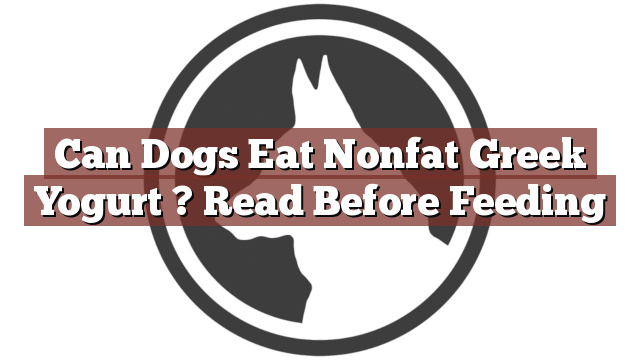Understanding Your Dog’s Dietary Needs
As responsible pet owners, it is essential to understand the dietary needs of our furry friends. Dogs are omnivores, meaning they can eat both meat and plant-based foods. However, not all human foods are safe or suitable for dogs. It is crucial to be aware of what is safe to feed them and what can potentially harm their health.
Can Dogs Eat Nonfat Greek Yogurt? Read Before Feeding
Can dogs eat nonfat Greek yogurt? This is a question that often arises among dog owners looking for healthy treat alternatives for their pets. The answer is yes, dogs can eat nonfat Greek yogurt in moderation. Yogurt contains probiotics, which can be beneficial for dogs’ digestive health, just as it is for humans. However, it is important to note that not all dogs can tolerate dairy products, and some may be lactose intolerant. Therefore, it is recommended to introduce yogurt slowly and monitor your dog’s reaction.
Pros and Cons of Feeding Nonfat Greek Yogurt to Dogs
Feeding nonfat Greek yogurt to dogs has several potential benefits. Firstly, it is a good source of protein, calcium, and vitamins such as B12 and riboflavin. These nutrients contribute to the overall health and well-being of your dog. Additionally, yogurt can improve digestion and assist in the development of healthy gut bacteria. The probiotics found in yogurt can help alleviate gastrointestinal issues such as diarrhea or constipation.
However, it is essential to be cautious when feeding yogurt to dogs. Some dogs may have difficulty digesting lactose, leading to gastrointestinal upset. If your dog experiences symptoms such as diarrhea, gas, or bloating after consuming yogurt, it may be a sign of lactose intolerance. In such cases, it is best to avoid feeding yogurt to your dog or opt for lactose-free alternatives.
Conclusion: Is Nonfat Greek Yogurt Safe for Dogs?
In conclusion, nonfat Greek yogurt is safe for dogs, but it should be given in moderation and with consideration of any potential lactose intolerance. When introducing yogurt into your dog’s diet, start with small amounts and observe their reaction. If your dog shows any signs of digestive upset, it is best to consult with a veterinarian to determine the cause and find suitable alternatives.
Remember that while yogurt can offer some health benefits, it should not replace a balanced and nutritious diet formulated specifically for dogs. Always prioritize their regular dog food and consult with your veterinarian before making any significant changes to their diet. By understanding your dog’s dietary needs and making informed choices, you can ensure their health and well-being for years to come.
Thank you for taking the time to read through our exploration of [page_title]. As every dog lover knows, our furry friends have unique dietary needs and responses, often varying from one canine to another. This is why it's paramount to approach any changes in their diet with caution and knowledge.
Before introducing any new treats or making alterations to your dog's diet based on our insights, it's crucial to consult with a veterinarian about [page_title]. Their expertise ensures that the choices you make are well-suited to your particular pet's health and well-being.
Even seemingly harmless foods can sometimes lead to allergic reactions or digestive issues, which is why monitoring your dog after introducing any new food item is essential.
The content provided here on [page_title] is crafted with care, thorough research, and a genuine love for dogs. Nevertheless, it serves as a general guideline and should not be considered a substitute for professional veterinary advice.
Always prioritize the expert insights of your veterinarian, and remember that the health and happiness of your furry companion come first.
May your journey with your pet continue to be filled with joy, love, and safe culinary adventures. Happy reading, and even happier snacking for your canine friend!

